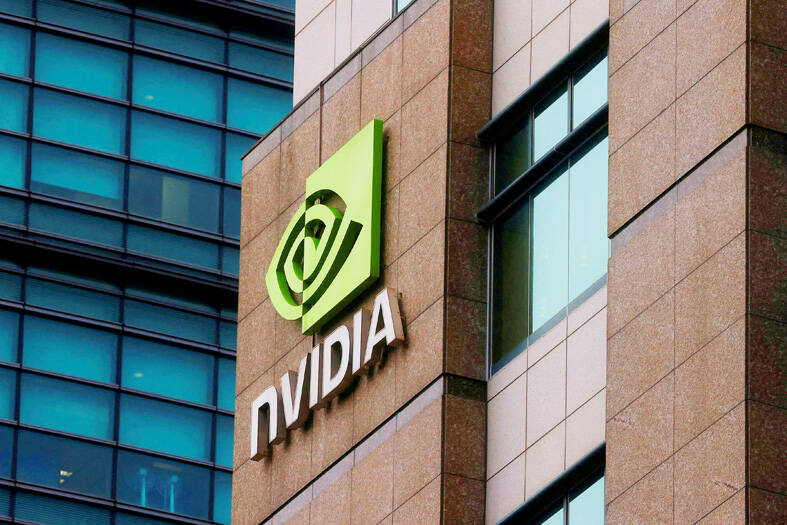Nvidia Corp plans to help build an artificial intelligence (AI) tech-related ecosystem in Japan to meet demand in a country eager to gain an edge in this emerging technology.
The US company will seek to partner with Japanese research organizations, companies and start-ups to build factories for AI, Nvidia CEO Jensen Huang (黃仁勳) said yesterday during opening remarks in a meeting with Japanese Minister of Economy, Trade and Industry Yasutoshi Nishimura.
The company is to set up an AI research laboratory, and invest in local start-ups and educate the public on using AI, Huang said.

Photo: Ann Wang, Reuters
Huang earlier this week met with Japanese Prime Minister Fumio Kishida and promised to do his best to prioritize Japan, local news reports said.
Tokyo is trying to regain tech leadership by leveraging its expertise in materials science and chipmaking tools, and by supplying billions of dollars in subsidies to ramp up local production of cutting-edge semiconductors. However, it has largely missed out on the lion’s share of profits related to generative AI so far. Huang said that Japan could build its own AI ecosystem.
“Japan has all of the technical expertise, the industrial capability to create your own artificial intelligence right here in Japan,” Huang told Nishimura, adding that the East Asian nation has decades of expertise in megatronics, manufacturing and robotics.
Japan can build its own AI infrastructure, harnessing Japanese data to create its own AI, he said.
Nvidia supplies chips to Japanese companies, including Softbank Corp, NEC Corp, Nippon Telegraph & Telephone Corp’s mobile and data services arms, as well as Sakura Internet Inc and Mitsui & Co, Huang said.
“For Japan to develop its own generative AI, we need Nvidia’s GPUs [graphics processing units]. We cannot do it without collaborating,” Nishimura said. “I’d like to see Japan lead the world in innovation through deepened partnership with Nvidia.”
Separately, Singapore plans to triple its pool of AI experts, including machine-learning scientists and engineers, to 15,000, as part of its national AI strategy, Singaporean Deputy Prime Minister Lawrence Wong (黃循財) said on Monday.
The Southeast Asian nation of 5.45 million, which is home to the Asian headquarters of global tech giants, such as Google owner Alphabet Inc and Microsoft Corp, said it would also work to boost its available high-performance computing resources by securing access through partnerships with chipmakers and cloud service providers.
Nvidia revenue for the quarter that ended in October included US$2.7 billion that originated from Singapore, trailing only the US, China and Taiwan, a company filing to the US Securities and Exchange Commission showed.
Singapore also pledged under its AI strategy to increase government incentives for the sector, including by backing accelerator programs for AI start-ups and encouraging companies to set up AI “centers of excellence,” ramp up local AI training programs and operate a supply of GPUs to be available to the country’s researchers.
Additional reporting by Reuters

Application-specific integrated circuit designer Faraday Technology Corp (智原) yesterday said that although revenue this quarter would decline 30 percent from last quarter, it retained its full-year forecast of revenue growth of 100 percent. The company attributed the quarterly drop to a slowdown in customers’ production of chips using Faraday’s advanced packaging technology. The company is still confident about its revenue growth this year, given its strong “design-win” — or the projects it won to help customers design their chips, Faraday president Steve Wang (王國雍) told an online earnings conference. “The design-win this year is better than we expected. We believe we will win

Intel Corp chief executive officer Lip-Bu Tan (陳立武) is expected to meet with Taiwanese suppliers next month in conjunction with the opening of the Computex Taipei trade show, supply chain sources said on Monday. The visit, the first for Tan to Taiwan since assuming his new post last month, would be aimed at enhancing Intel’s ties with suppliers in Taiwan as he attempts to help turn around the struggling US chipmaker, the sources said. Tan is to hold a banquet to celebrate Intel’s 40-year presence in Taiwan before Computex opens on May 20 and invite dozens of Taiwanese suppliers to exchange views

Chizuko Kimura has become the first female sushi chef in the world to win a Michelin star, fulfilling a promise she made to her dying husband to continue his legacy. The 54-year-old Japanese chef regained the Michelin star her late husband, Shunei Kimura, won three years ago for their Sushi Shunei restaurant in Paris. For Shunei Kimura, the star was a dream come true. However, the joy was short-lived. He died from cancer just three months later in June 2022. He was 65. The following year, the restaurant in the heart of Montmartre lost its star rating. Chizuko Kimura insisted that the new star is still down

While China’s leaders use their economic and political might to fight US President Donald Trump’s trade war “to the end,” its army of social media soldiers are embarking on a more humorous campaign online. Trump’s tariff blitz has seen Washington and Beijing impose eye-watering duties on imports from the other, fanning a standoff between the economic superpowers that has sparked global recession fears and sent markets into a tailspin. Trump says his policy is a response to years of being “ripped off” by other countries and aims to bring manufacturing to the US, forcing companies to employ US workers. However, China’s online warriors